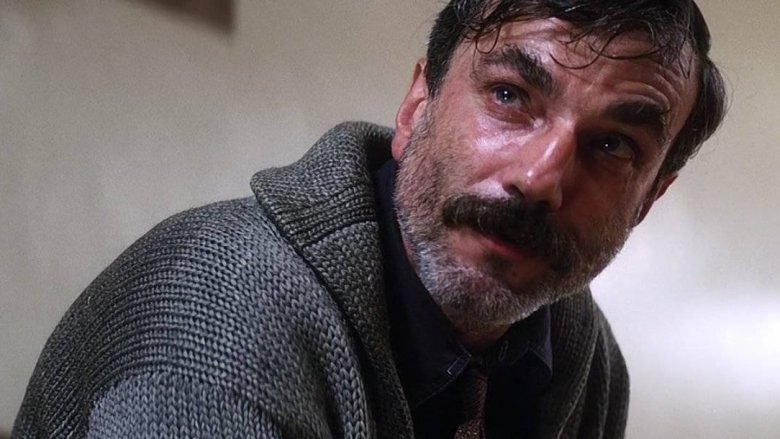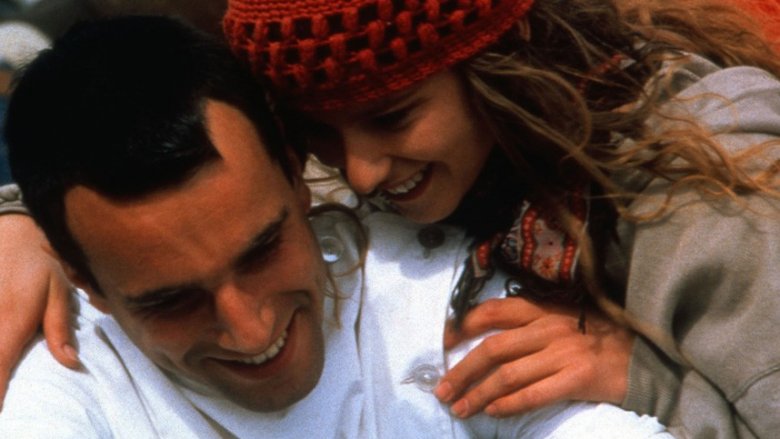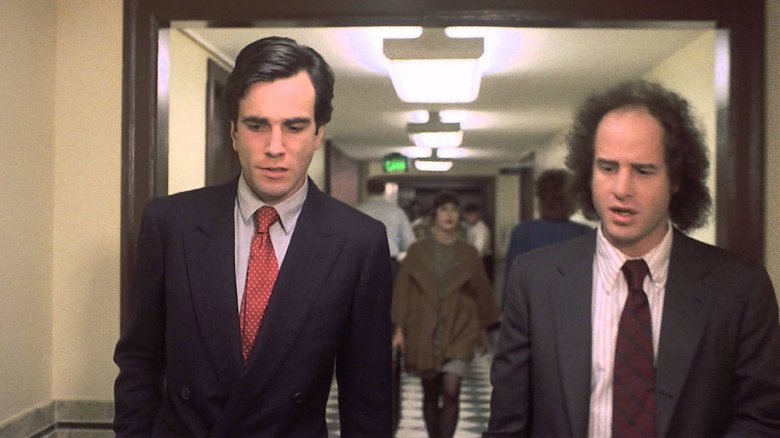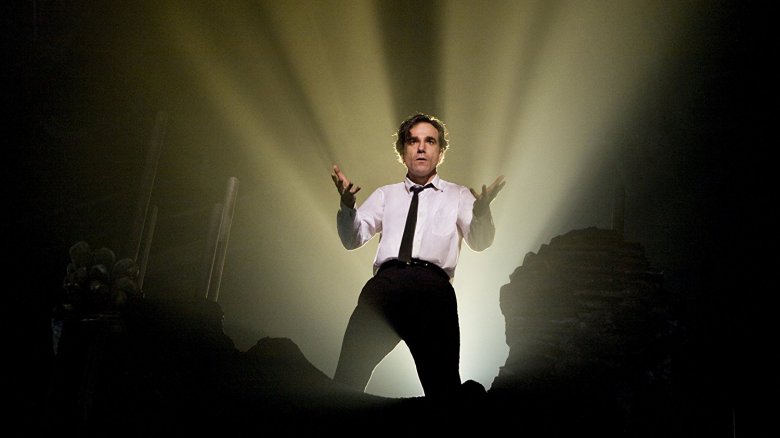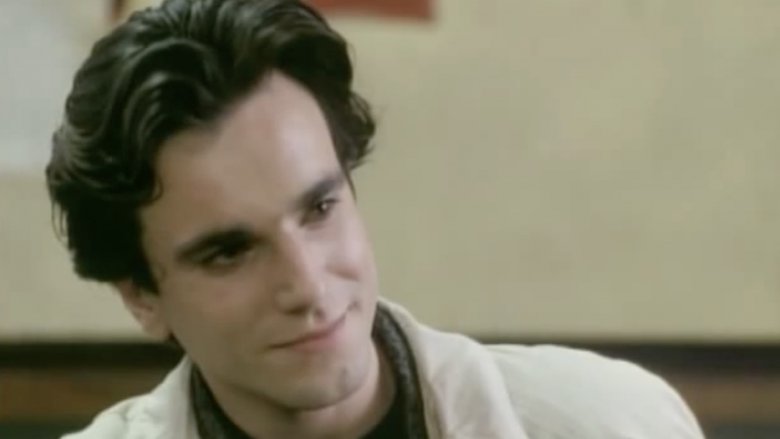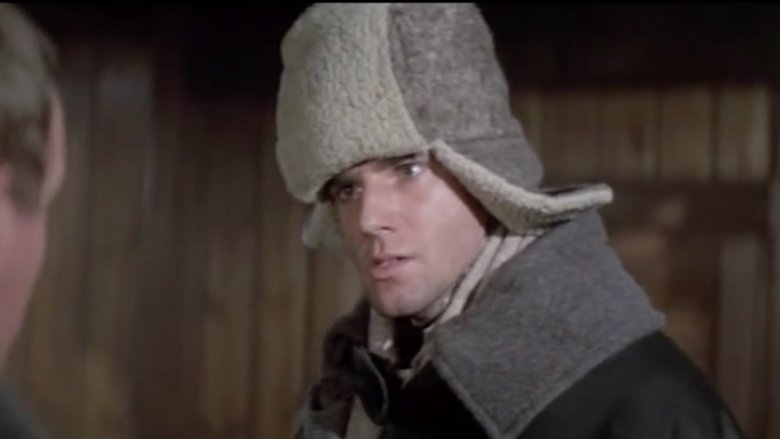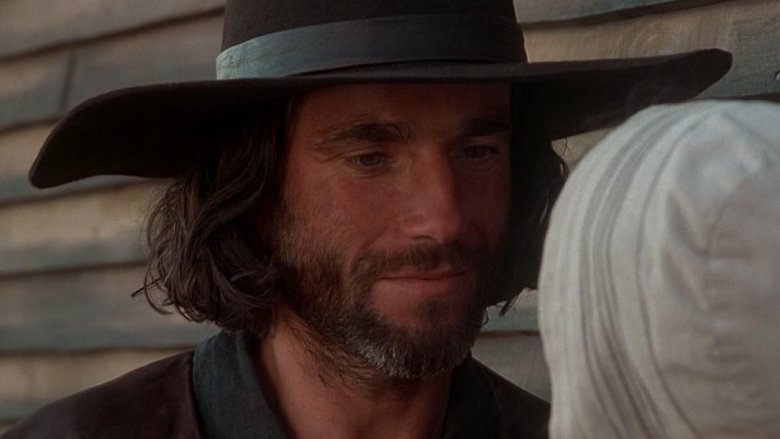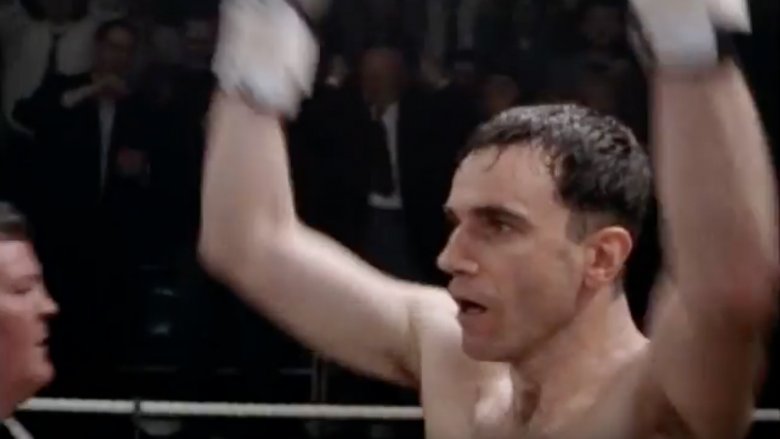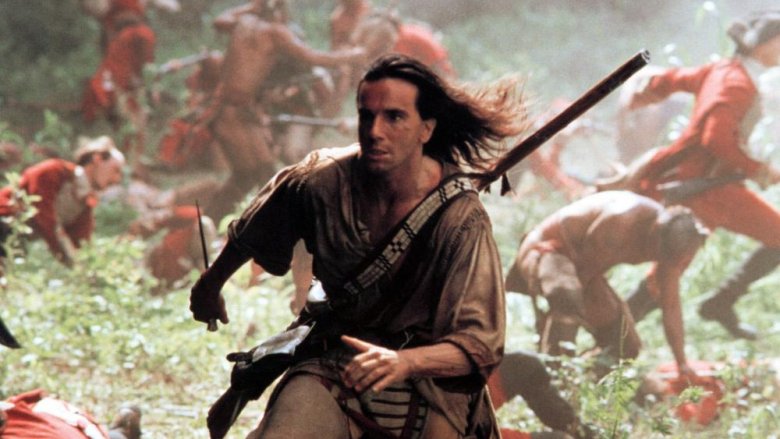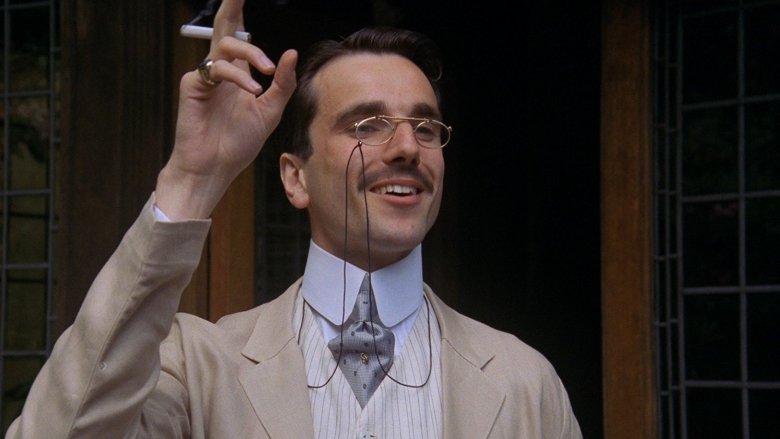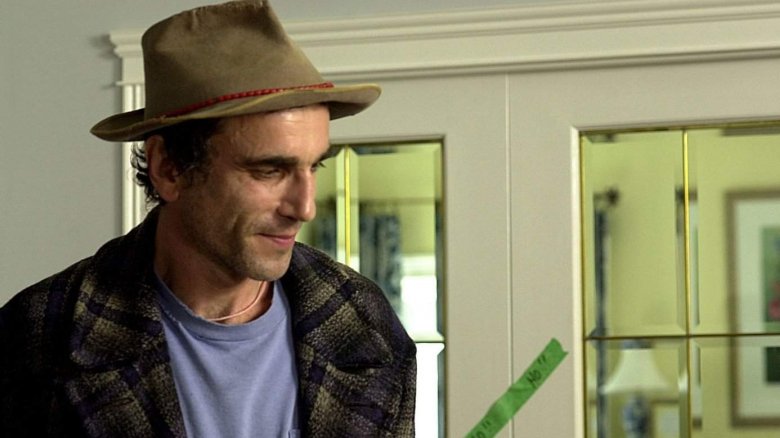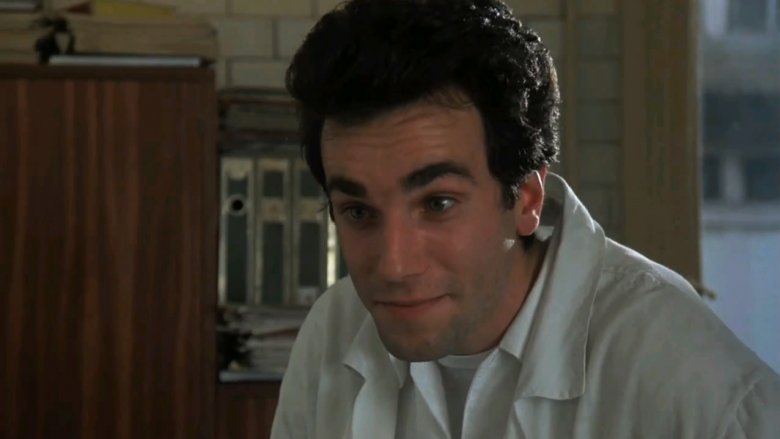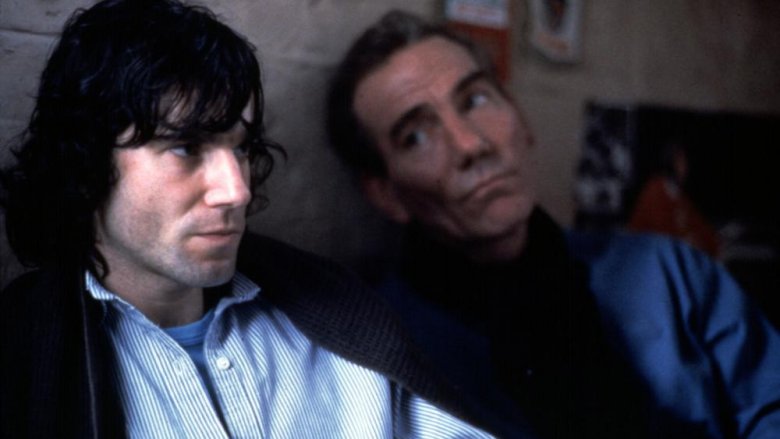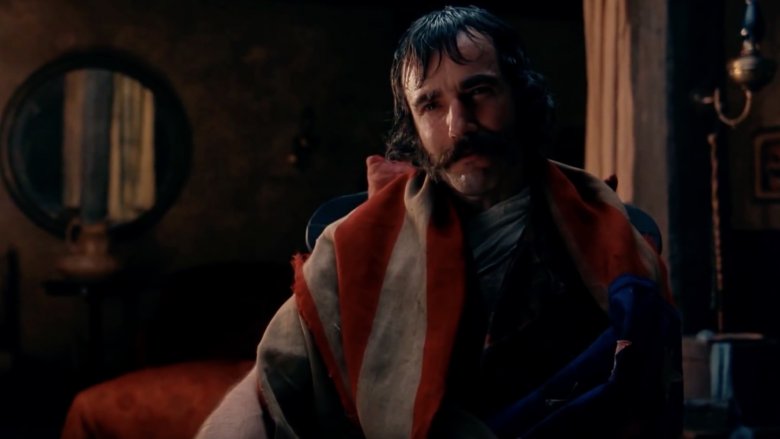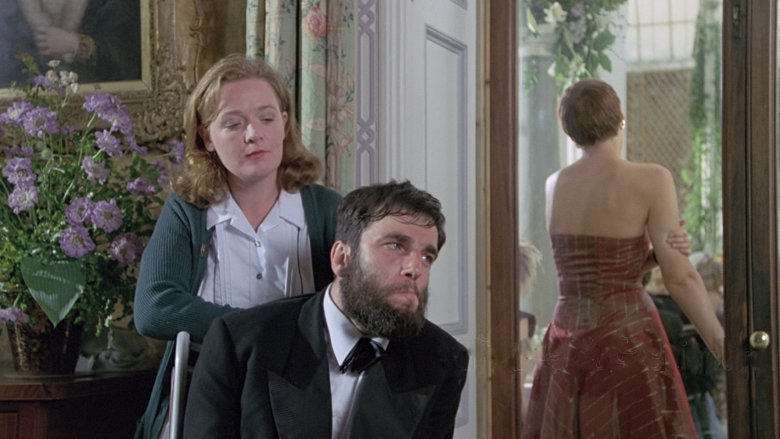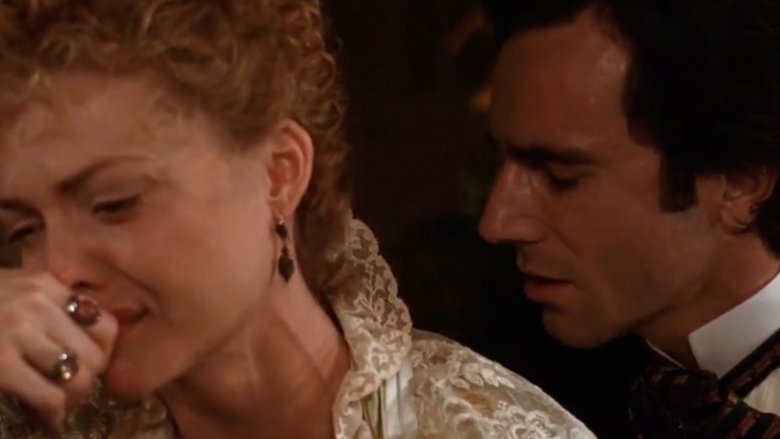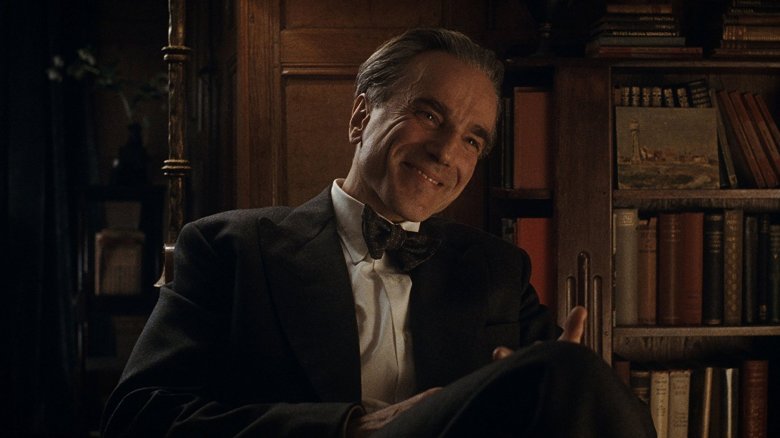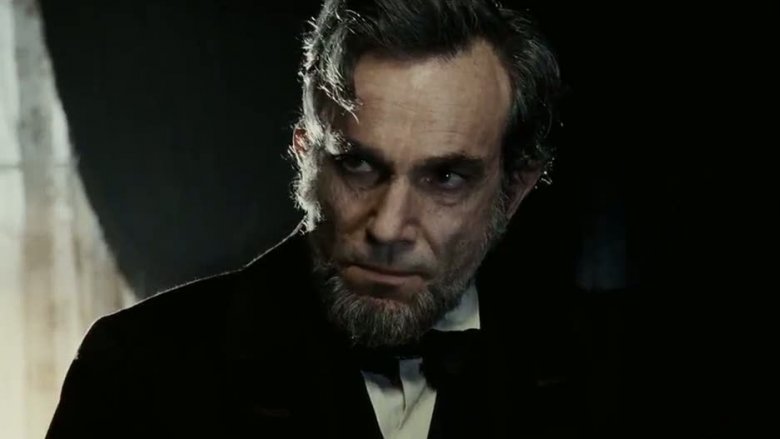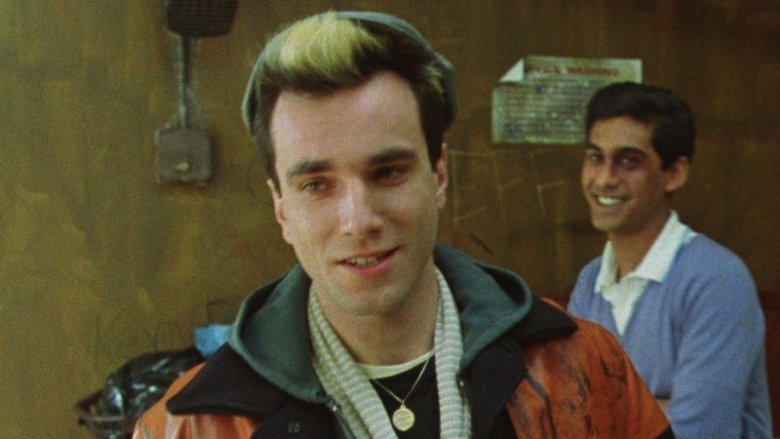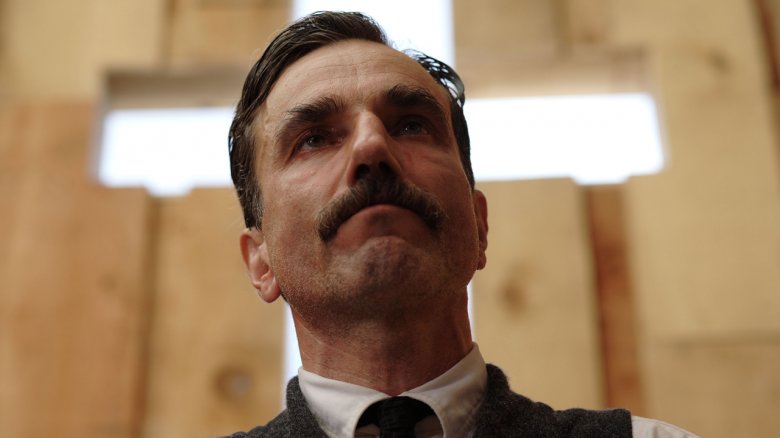Every Daniel Day-Lewis Movie Ranked Worst To Best
Over the past 30 years, Daniel Day-Lewis has become one of the most intensely celebrated actors in the history of cinema. In that time, he's also been one of the pickiest. After scoring a barely there big-screen debut in 1981's Ghandi, Day-Lewis has made just 19 screen appearances since.
Despite the actor's frequent and extended absences from the movie theaters, the film world was shocked late last year when Day-Lewis' reps announced that his upcoming appearance in Paul Thomas Anderson's Phantom Thread would be his last film. As the notorious method actor wraps up his legendary career with one final stroll through awards season madness, there's no better time to revisit his life in front of the camera — and to rank his every role.
Eversmile, New Jersey (1989)
We're betting most of you haven't even heard of Eversmile, New Jersey, let alone seen it. You're not alone. Day-Lewis had built a solid fan base amongst critics by the time Eversmile was released, but this pseudo-satirical tale of a traveling dentist bringing modern dentistry to South America failed to impress critics and was virtually unseen outside of the festival circuit.
That may be because it's the one film where DDL's method intensity comes off as over the top, though the actor isn't entirely at fault for that. The film was reportedly hijacked in post-production by skittish producers who released a boring, predictable romantic drama with little sense of romance or drama. Don't feel too bad for Day-Lewis though, even if Eversmile didn't work out, the actor actually took home his first Oscar for his other 1989 release. More on that film later.
Stars and Bars (1988)
Every actor has some sort of Kryptonite, even Daniel Day-Lewis. Though he's become one of the most respected dramatic actors in history, he never quite found his legs for broad comedy. Though DDL has largely avoided the genre altogether — settling instead for scoring specific laughs in dramatic settings — he gave comedy a genuine go in 1988's Stars and Bars. We're betting he still regrets that decision.
Make no mistake, Stars and Bars is painfully bad, and Day-Lewis mostly looks lost as the straight man in this madcap, fish-out-of-water tale about a British art expert trying to buy a Renoir from from colorful cast of characters in the American South. Still, as bad as Stars and Bars is, it's worth a look to see DDL go toe to toe with the likes of Harry Dean Stanton, Joan Cusack, Martha Plimpton, Steven Wright, and current Lady Bird sensation Laurie Metcalf.
Nine (2009)
Loosely based on Italian auteur Federico Fellini's experiences crafting his masterpiece 8 1/2, the film Nine was primed to be one of the biggest hits of 2009. The film was penned by Oscar winner Anthony Minghella, costarred five Oscar-winning actresses (Nicole Kidman, Marion Cotillard, Judi Dench, Sophia Loren, and Penélope Cruz), was helmed by Oscar-nominated director Rob Marshall (Chicago) and featured Daniel Day-Lewis (fresh off his third Oscar win for There Will Be Blood).
When Nine hit theaters late in 2009, the $80 million musical fell flat on its face with critics and audiences. If you've seen the film, well, you know why. Though the production values are outstanding, the story is predictable, the songs are forgettable and Day-Lewis' overly angst-ridden performance (and flaky Italian accent) proved less than charming. Still, the thought of DDL singing and dancing should be enough for anyone to give this film a shot, even if it stands as the worst reviewed effort in the actor's oeuvre.
Nanou (1986)
A European-set romantic drama involving a young British woman falling in love with a French revolutionary? That's a film that fits snugly into Day-Lewis' wheelhouse. Coupled with the actor's 1988 release, The Unbearable Lightness of Being, Nanou proves a potent yet subtle companion piece, one that finds Day-Lewis making the most of one of his few supporting turns.
Since Day-Lewis is not the star of the show in Nanou, his screen time errs on the side of brief. Still, even in this protracted role, the actor brings a sort of casual intensity to the proceedings and a welcome three dimensions to an otherwise bland character. To be clear, this is hardly Day-Lewis at his best, but his Nanou performance serves as an intriguing look at not just where the actor has been but also where he was headed.
The Bounty (1984)
As far as DDL's supporting roles go, few had a bigger impact on his career than his turn as John Fryer in 1984's sea-faring epic The Bounty. Recounting the tale of the real-life mutiny aboard the titular 18th century British vessel, The Bounty was just Day-Lewis' second feature film, and it pit him against the likes of Anthony Hopkins, Mel Gibson, Liam Neeson, and Sir Laurence Olivier.
To say that Day-Lewis held his own is an understatement. Behind a sly, knowing gaze and a self-serving smugness, the actor used his limited screen time to display both the metered charm and disquieting intensity that would soon become his trademarks. In doing so, he manages to stand tall next to a couple of U.K. acting legends and delivers the first truly memorable performance of his career.
The Crucible (1996)
This adaptation of Arthur Miller's Salem witch trials drama was one of the more underrated films of 1996. Though The Crucible may look and feel a little dated 20 years after its release, it remains a dramatically charged exploration of the fickleness of man and the power of words; not to mention a searing indictment of McCarthy-era politics (the original, and very much intended, goal of the original play).
At the heart of that drama lay one of the most overlooked performances in Daniel Day-Lewis' lauded career. For much of the film's runtime, his slow-burning portrayal of philandering Puritan John Proctor is a study in restraint, with Day-Lewis mostly keeping the character's simmering desires and swelling desperation firmly bottled up. When the actor finally lets loose in the film's final moments, the raw emotion on display is both jarring and entrancing, and his reading of Miller's famous "because it is my name" speech remains one of the most complex and impassioned performances Day-Lewis has ever delivered.
The Boxer (1997)
By the time Daniel Day-Lewis stepped into the ring for Jim Sheridan's politically charged boxing drama The Boxer, his reputation as a devout method actor had been well established. DDL went all out in his prep for this film's boxing scenes, training for two full years with professional boxers to ensure his in-ring authenticity. According to his coach, when cameras finally started rolling on The Boxer, Day-Lewis had become a force to be reckoned with, and "could easily have contested real boxing matches."
That dedication led to some electrifying action inside the ring. Luckily, Day-Lewis saved some intensity for the action outside the ring as well, delivering an emotionally raw yet romantic portrayal of a deeply conflicted man trying to overcome an almost impossible cultural clash. Even if the film often feels overshadowed by Day-Lewis' performance, it stands as a must-see for fans of his (and Jim Sheridan's) work.
The Last of the Mohicans (1992)
For all the dramatic and physical intensity Daniel Day-Lewis brings to his performances, the actor's sculptured good looks have often pegged him as a tragically romantic figure as well. When Michael Mann set his sights on bringing The Last of the Mohicans to the big screen, DDL proved one of the few actors around capable of carrying the multi-faceted demands of the role.
Once he stepped into character, Day-Lewis more than carried the part. In fact, his physically imposing, unabashedly romantic portrayal of Nathaniel Poe (aka Hawkeye) ended up carrying Mann's film. Coupled with Mann's stylish, period-authentic vision, Day-Lewis' impassioned performance helped make The Last of the Mohicans a critical and commercial smash. That performance rightfully remains one of Day-Lewis' most beloved, if only because no one could forget his "stay alive no matter what occurs" moment.
A Room With a View (1985)
With his uncanny ability to portray outward calm while also projecting deep inner turmoil, Day-Lewis' venture into the emotionally stifled, yet complex world, of Merchant-Ivory was sort of inevitable. Still, nothing can quite prepare you for the smarmy enmity the actor brings to his role in A Room with a View.
Day-Lewis' turn as the snooty, utterly unlikable Cecil Vyse proves a stark counterpoint to the spirited presence of Julian Sands' George Emerson. It's DDL's ability to make Cecil a fully formed character and not just a stock romantic villain that drives the film's central conflict, and it's the advent of the prim and prickly resolve he brings to Cecil that punctuates the exquisite warmth that overcomes A Room with a View whenever Sands and Helena Bonham-Carter share the screen. Anyone who's spent a little time in the Merchant-Ivory world knows just how important even the tiniest bit of warmth can be.
The Ballad of Jack and Rose (2005)
Daniel Day-Lewis has more than earned his reputation as a ferocious, scene-chewing performer. So much so that his ability to internalize emotional strife is often undervalued. That ability is on full display in The Ballad of Jack and Rose, and it's what makes the film such a compellingly subdued bit of drama.
Written and Directed by DDL's wife, Rebecca Miller, the film follows a father and his virginal teenage daughter who together live an idyllic existence in an isolated commune. The fragility of that existence begins to show with Rose's emerging sexuality, a matter amplified when Jack invites his girlfriend and her teen sons to move in. As his life spins out of control, Day-Lewis' outward calm gives way to a callous, frenzied bitterness, but the actor never quite gives over to the darkness. Rather, the Day-Lewis' subtle transformation lends a delicate sense of tragedy to Miller's film — and makes The Ballad of Jack and Rose one of the finest (if tragically overlooked) works in the actor's impressive catalog.
The Unbearable Lightness of Being (1988)
Here's another under-seen gem. Adapted from Milan Kundera's politically and erotically charged novel, and directed by the legendary Philip Kaufman, The Unbearable Lightness of Being casts Day-Lewis as a sexually adventurous doctor caught in an unexpected three-way love affair with two women in 1960s Czechoslovakia.
If you know anything about Czech history, then you know those sexual adventures are doomed to be undermined by the coming Soviet invasion. To say that matters get complicated in The Unbearable Lightness of Being is an understatement, but this sprawling adaptation never backs down from the story's trickier narrative elements, often besting the novel by ignoring its more cynical corners and focusing instead on the intimate relationships often overlooked by grand historical indifference.
DDL's rich, nuanced performance (bolstered by equally brilliant turns from Lena Olin and Juliette Binoche) keep those conflicts from devolving into melodrama and allows the film to resonate on a profoundly human level.
In the Name of the Father (1993)
Daniel Day-Lewis has been famously picky about his roles over the years. That means he's been just as picky about the directors he's worked with. It speaks volumes of his relationship with Irish auteur Jim Sheridan that DDL worked with him three times. In the Name of the Father was the middle film for the duo, and it's widely regarded as their best.
In the Name of the Father follows the true story of a young Irishman wrongfully imprisoned for an IRA-sponsored crime he did not commit and his 15-year fight to be freed. That fight is as heartbreaking and utterly engrossing as you might imagine. The film is flawlessly executed by Sheridan, and DDL's performance (alongside a never better Pete Postlethwaite) is nothing short of awe-inspiring. Simply put, if you haven't seen this film, then you are not a Daniel Day-Lewis fan.
Gangs of New York (2002)
After his physically and emotionally demanding turn in The Boxer, Day-Lewis took an extended break from making movies. When the actor finally stepped back in front of cameras — five years later — it appears he had some pent-up energy to release. He put every bit of it into his enigmatic performance as Bill "The Butcher" Cutting in Gangs of New York.
Though even calling Day-Lewis' work on Gangs a mere "performance" does it a disservice. The actor is a veritable force of nature in the film, forging fear and menace with every boisterously lascivious word and violent tantrum he could muster — not to mention that penetrating, genuinely terrifying gaze. His Gangs performance is so overpowering that a clearly intimidated Leonardo DiCaprio and a horribly miscast Cameron Diaz are all but consumed in its shadow. Luckily, Martin Scorsese's visceral, bloody look at New York's grisly formative years doesn't suffer the same fate.
My Left Foot (1989)
Did we mention that Daniel Day-Lewis has a reputation for being an intensely dedicated performer? Well, he took his method-madness to the extreme for 1989's My Left Foot, his first collaboration with Jim Sheridan. For those of you unfamiliar with the film, it tells the inspirational true story of Christy Brown, an Irishman born with cerebral palsy who would go on to learn how to write and paint with the only one of his limbs that he could control, his left foot.
To the astonishment of even DDL's most avid fans, the actor actually learned how to do the same for My Left Foot (though he could only manage that monumental task with his right foot). But Day-Lewis' performance was more than a one-trick pony. The actor committed the entirety of his mind, body and soul to his portrayal of Brown. That dedication transformed My Left Foot from a weepy biopic into an uplifting celebration of the human spirit. It also earned the actor his first Academy Award.
The Age of Innocence (1993)
Had The Age of Innocence not been set in nineteenth-century New York and directed by Martin Scorsese, its tale of illicit desires, unrequited love, and silent suffering in high society might easily have been mistaken for another stuffy Merchant-Ivory offering. As it is a Scorsese film, there's an immediacy and intensity to The Age of Innocence's bustling romanticism that the Merchant-Ivory team would never have been comfortable with.
Much of that intensity comes from the passionately restrained performance of Daniel Day-Lewis. The actor's fevered silences and steely glances imbue the film with an unbridled (if understated) eroticism. That energy, bolstered by his white-hot chemistry with Michelle Pfeiffer, brought a welcome seediness to the otherwise stuffy chamber piece and transformed The Age of Innocence into a refreshingly honest look at the often sordid underbelly of high society worthy of both actor and his esteemed director.
Phantom Thread (2017)
Speaking of sordid underbellies, have you seen Phantom Thread yet? No? We'll keep this brief then, 'cause we wouldn't want to spoil one scintillating moment of Paul Thomas Anderson's cheeky peek inside the life of venerated (fictional) dressmaker Reynolds Woodcock. Woodcock is a man of particular tastes, that his life is painstakingly ordered and that it's ultimately tested by a strong-willed female companion.
Phantom Thread is slated to be DDL's final film appearance. If that proves to be true, the actor has held nothing back in his big-screen swan song, disappearing into a performance as fierce and funny and as natural and nuanced as any of his career. That he does so with such effortless grace is the reason he should take home an unprecedented fourth Academy Award (as Best Actor) in 2018, even if his ability to make it look so easy is also the reason he might not. Either way, DDL left nothing on the table for his final act.
Lincoln (2012)
Of course, winning back-to-back Oscars is no easy task, even if your last film was released five years ago. Day-Lewis took home his third statue for Steven Spielberg's Lincoln and, well, his portrayal of America's 16th president is the stuff of legend.
Following Honest Abe's attempts to pass a constitutional amendment banning slavery in the United States over the waning days of The Civil War, Lincoln is that rare historical drama that finds profound intimacy in the heedless machinations of history. The film's intimate nature hinged almost entirely on Day-Lewis' passionate, dignified portrayal of the late president. More than just a collection of affected speech patterns, mannerisms and a top hat, what Day-Lewis brings to the surface in Lincoln is the thoughtfulness and integrity that the man behind the story ultimately brought to the office. What DDL delivers in Lincoln is nothing short of the most humanizing portrait of Abraham Lincoln ever committed to film.
My Beautiful Laundrette (1985)
Stephen Frears' witty, wistful romantic drama My Beautiful Laundrette remains an important film for several reasons. First and foremost, it stands as a staggeringly honest (and still relevant) portrait of culture clashes in 1980s Britain. It's one that doesn't bat a single lash at exploring not just lines between racial and religious cultures but also those between hetero and homosexual culture.
It should come as no surprise that a young Daniel Day-Lewis would be drawn to a film with such complex subject matter. Complex has always been the name of the game for the actor, and his Johnny (a gay man entrenched in the U.K. punk scene) is the very definition of the word. Day-Lewis' captivating turn — equal parts fragile and ferocious — in My Beautiful Laundrette is the one that put him on the map. It just so happens that it's still one of his strongest.
There Will Be Blood (2007)
Even if DDL hadn't uttered the now iconic words "I drink your milkshake!" in There Will Be Blood, his performance in the film would still rank at the top of this list, mostly because, on paper, Daniel Plainview isn't all that interesting a character. In Day-Lewis' hands, the greedy oil man breeds awe and menace with every metered word and caustic glance. In Day-Lewis' hands, Plainview becomes a genuine monster, a mortal vampire bent on sucking every drop of blood and oil and humanity that his enemies (and even the Earth itself) have to offer.
It's almost impossible to explain how great Day-Lewis is in this film. You simply have to experience his performance to understand. There Will Be Blood doesn't just boast the finest performance of Daniel Day-Lewis' career, it may well feature the greatest performance by an actor in the history cinema. Seriously, if you can find a better one, we'd love to hear about it.
